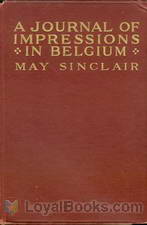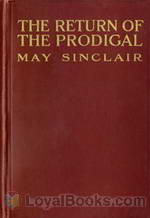|
Books Should Be Free Loyal Books Free Public Domain Audiobooks & eBook Downloads |
|
|
Books Should Be Free Loyal Books Free Public Domain Audiobooks & eBook Downloads |
|
Top Authors |
|---|
|
Book type:
Sort by:
|
By: Kate Dickinson Sweetser (-1939) | |
|---|---|
 Boys and girls from Thackeray
Boys and girls from Thackeray
| |
By: Thomas Jefferson Ritter (1855-) | |
|---|---|
 Mother's Remedies Over One Thousand Tried and Tested Remedies from Mothers of the United States and Canada
Mother's Remedies Over One Thousand Tried and Tested Remedies from Mothers of the United States and Canada
| |
By: M. Mignet (1796-1884) | |
|---|---|
 History of the French Revolution from 1789 to 1814
History of the French Revolution from 1789 to 1814
| |
By: May Sinclair (1863-1946) | |
|---|---|
 Mr. Waddington of Wyck
Mr. Waddington of Wyck
May Sinclair’s 1921 novel tells the story of the ridiculous Mr. Horatio Bysshe Waddington, a pompous, self-deluded poser making his way through life caring only for the impressions he makes on others. His long-suffering wife Fanny, his secretary Barbara, and the young scapegrace Ralph watch his daily performances with delighted, affectionate fascination as if they are spectators watching a play or scientists observing a new species, wondering every day how far he will go to fulfill his outrageous pretentions. As usual, Sinclair’s light, deceptively innocent prose camouflages a tale of sexual passions and human foibles with philosophical implications about her post-war world. | |
 Life and Death of Harriett Frean
Life and Death of Harriett Frean
Harriett Frean is a well-to-do, unmarried woman living a life of meaningless dependency, boredom, and unproductivity as she patiently cares for her aging parents, waiting for a man to marry. When her opportunity for Love finally comes, she is offered a moral dilemma: the man is engaged to her best friend. Should she sacrifice what, according to the priorities of the time, seems like her "one chance for happiness," or should she seize the moment? Can she make something meaningful of her life without... | |
 Three Sisters
Three Sisters
Fascinated as she was by the lives of the Brontë siblings, May Sinclair loosely based her subtly sensual, quietly insurrectionary 1914 novel The Three Sisters on the Haworth moor milieu of the three literary Brontë sisters. Alice, Gwenda, and Mary Cartaret are the daughters of the Vicar of Garth, an abusive father with rigid, selfish expectations for female behavior. Hope of rescue seems to dawn in the person of an idealistic young doctor in the village, but this is no Austen romance. Described... | |
 The Three Brontës
The Three Brontës
| |
 The Divine Fire
The Divine Fire
| |
 The Helpmate
The Helpmate
| |
 Romantic
Romantic
As a simple story told, "The Romantic" is one of Sinclair’s tightest and most compelling. Charlotte Redhead, a young British secretary, finds herself in a degrading extra-marital affair with her boss. In reaction, she renounces Sex and links herself platonically to a handsome young Bohemian (John Conway) she meets by chance, tramping in the fields. Together, under a powerful romantic excitement, the two rush off to Belgium in the early weeks of World War I, having organized their own little volunteer ambulance corps... | |
 The Combined Maze
The Combined Maze
| |
 Audrey Craven
Audrey Craven
In May Sinclair’s remarkable first novel, Audrey Craven is a beautiful young woman who has by her idiosyncracies acquired a thoroughly undeserved reputation for originality. In fact, Audrey is a shallow, selfish, malleable person of negligible intelligence, with a fastidious horror of anyone who might be considered a nobody. Her pursuit of the stimulation of extraordinary minds (and her persistent fantasy of being somebody’s Muse) brings her into contact with serious women and men representing the profoundest passions of art, religion, science, and love... | |
 Tysons
Tysons
Another frank May Sinclair exploration of fin de siècle English love and sex, marriage and adultery, "The Tysons" is the story of the caddish Nevill Tyson and his beautiful but frivolous young wife Molly. Sinclair uses a different narrative voice than we hear in much of her fiction, a sort of witty Jane Austen archness as she dissects the characters of the provincial village Drayton Parva. As always, she demonstrates an intriguing mixture of Victorian prudishness and modern free-thinking, particularly in her rendering of the sexual escapades of her characters... | |
 Journal of Impressions in Belgium
Journal of Impressions in Belgium
In 1914, at the age of 51, the novelist and poet May Sinclair volunteered to leave the comforts of England to go to the Western Front, joining the Munro Ambulance Corps ministering to wounded Belgian soldiers in Flanders. Her experiences in the Great War, brief and traumatizing as they were, permeated the prose and poetry she wrote after this time. Witness of great human pain and tragedy, Sinclair was in serious danger of her life on multiple occasions. This journal makes no attempt to be anything more than a journal: a lucid, simple, heart-breaking account of war at first hand. | |
 The Return of the Prodigal
The Return of the Prodigal
| |
 Mary Olivier: a Life
Mary Olivier: a Life
| |
 Anne Severn and the Fieldings
Anne Severn and the Fieldings
Written in an era of cheap, formulaic romantic fiction, the nuanced, seditious, quietly erotic novels of May Sinclair stand out like literature from another era entirely. There is romance in “Anne Severn & the Fieldings,” but it’s romance of the best and profoundest kind, set in the context of authentic human personalities and tragic historical events. The motherless Anne Severn is adopted into the Fielding family and grows up in intimate friendship with the three Fielding sons, all of whom love her... | |
 The Belfry
The Belfry
| |
 Superseded
Superseded
| |
 The Creators A Comedy
The Creators A Comedy
| |
By: William H. Hudson (1841-1922) | |
|---|---|
 A Crystal Age
A Crystal Age
A Crystal Age is a utopian novel written by W. H. Hudson, first published in 1887. The book has been called a "significant S-F milestone" and has been noted for its anticipation of the "modern ecological mysticism" that would evolve a century later. | |
By: S. Baring-Gould (1834-1924) | |
|---|---|
 The Book of Ghosts
The Book of Ghosts
Reverend Sabine Baring-Gould (1834-1924) was an English hagiographer, antiquarian, novelist and eclectic scholar. During his life, he published more than 100 books, among them this collection of ghost stories. | |
 The Book of Were-Wolves
The Book of Were-Wolves
| |
 Curious Myths of the Middle Ages
Curious Myths of the Middle Ages
This volume is an example of Sabine Baring-Gould's extensive research into the middle ages. This volume of 12 curiosities was one of Baring-Gould's most successful publications. | |
By: William H. Hudson (1841-1922) | |
|---|---|
 Afoot in England
Afoot in England
| |
By: William H. Hudson (1841-1922) | |
|---|---|
 Shepherd's Life; Impressions Of The South Wiltshire Downs
Shepherd's Life; Impressions Of The South Wiltshire Downs
Hudson wrote this classic work in 1910; it is admiringly mentioned by many other writers. It focuses on the memories of a head shepherd, Caleb Bawcombe, so it is concerned with the period of mid to late nineteenth century rural Wiltshire, a county in England. This pleasant engaging book contains rural wisdom, natural history, farming practices, human characters, and more | |
 The Naturalist in La Plata
The Naturalist in La Plata
| |
 Birds in Town and Village
Birds in Town and Village
| |
By: S. Baring-Gould (1834-1924) | |
|---|---|
 In Troubadour-Land A Ramble in Provence and Languedoc
In Troubadour-Land A Ramble in Provence and Languedoc
| |
By: William H. Hudson (1841-1922) | |
|---|---|
 Dead Man's Plack and an Old Thorn
Dead Man's Plack and an Old Thorn
| |